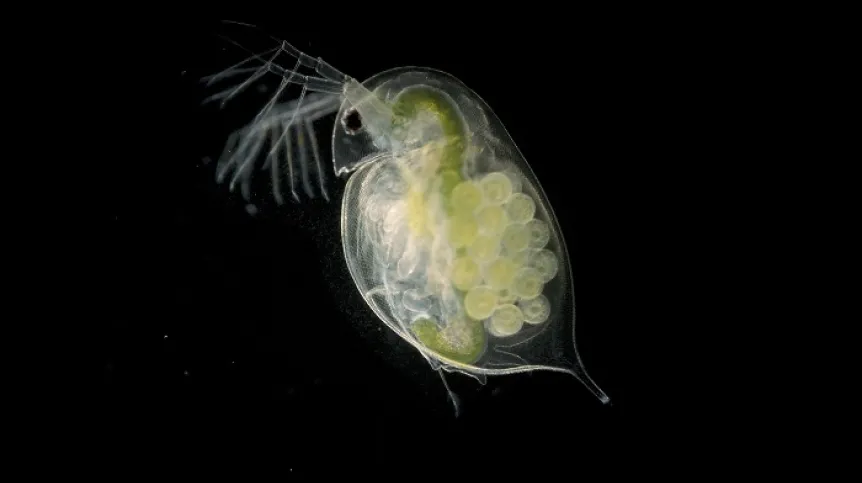
Scientists have observed repetitive behaviours in Daphnia, a freshwater arthropod, that, in the language of behavioural ecologists, can be called 'personality'. Scientists wonder what its purpose is and what role it has played throughout evolution.
The history of science shows that it has taken many years for scientists to stop looking at animal behaviour as a series of unconditional reflexes. When it became obvious to vertebrate scientists that genes, environment, and experience influenced behaviour, it did not automatically spark interest in invertebrates from the same angle.
Dr. Barbara Pietrzak from the Department of Hydrology at the University of Warsaw believes that the explanation can be found in difficult to overcome obstacles related to conducting research. Invertebrates have always been more difficult to observe and label for study purposes. With the development of technology, cameras and even special algorithms have appeared that help distinguish one Daphnia from another.
'+Animal personalities+ is a well-established term in English language literature. When translated to Polish, it may be difficult to understand for the reader. The term describes the repeated behaviour of an animal, developed during the entire life of the organism,’ says Dr. Pietrzak.
The first paper showing that the behaviour of specific Daphnia may differ from one another was published a few years ago in Scandinavia. Scientists then asked the question to what extent genes are responsible for a specific behaviour, and to what extent the behaviour is learnt under the influence of life experience.
Dr. Pietrzak’s team analysed data on the behaviour of Daphnia and designed a study in which they observed Daphnia swimming in single tubes.
'In their natural environment, Daphnia move vertically, so the tube simulated their environment. The tubes were placed in a thermally stratified aquarium, where the temperature was warm at the top and cold at the bottom. The light fell from above. In this way, we recreated the physical conditions prevailing in lakes,’ Pietrzak says.
It turned out that when scientists added an ingredient to the water that the Daphnia associated with the presence of a predator, they all dived deeper - which is interpreted as a natural escape reflex. However, not all of them dived to the same depth, even though they came from the same genetic line.
'We have shown that Daphnia have preferences - each has its own tactics. They are permanently different from each other. This revealed something that we can call +personality+ - i.e. the repetition of the same behaviour in a specific situation. Daphnia behave differently - even though they are genetically are the same,’ Pietrzak says. She adds that the results of her research are at the review stage in one of the scientific journals.
The next step will be to check whether the experience of a predator's presence permanently changes the behaviour of Daphnia. Scientists want to find out whether Daphnia will still dive deep when there is no predator around anymore.
'I am interested in the function of +personality+. Why did evolution allow such limitations on possibilities? Personality limits the spectrum of action. In every situation there is a specific most advantageous behaviour, but not every behaviour is available to each individual,’ Pietrzak says.
In a paper published in the journal Ecohydrology & Hydrobiology, Barbara Pietrzak and Alicja Fundali from the Institute of Functional Biology and Ecology at the University of Warsaw summarized what scientists had so far determined about the types of 'personality' in freshwater fish. Back in 2007, scientists wrote that 'animal personalities are considered at a few life-organisation levels'. Scientists mentioned the individual level and differences in behaviour between family groups, populations and species.
'When animal behavioural types are considered in the context of stress response, they are referred to as coping styles (...) And when behavioural types are studied more broadly in ecological or evolutionary context, they are usually considered within the five personality dimensions: boldness, exploration, activity, aggressiveness and sociability,’ the scientists say.
Just like mammals, captive fish respond to stress in two ways - proactive (fight or flight) or reactive (passive approach).
Proactive fish have different physiological characteristics than passive fish. Research on rainbow trout has shown, for example, that the coping style is related to the fish's cognitive abilities - memory and learning, and also translates into the rate of development.
'Failure to take into account the coping styles of fish in the farming conditions can lead to production and welfare problems,’ the scientists say. Fish that are aggressive (in response to stress) are characterized by reduced growth and lower resistance to diseases.
PAP - Science in Poland, Urszula Kaczorowska
uka/ zan/ kap/
tr. RL













